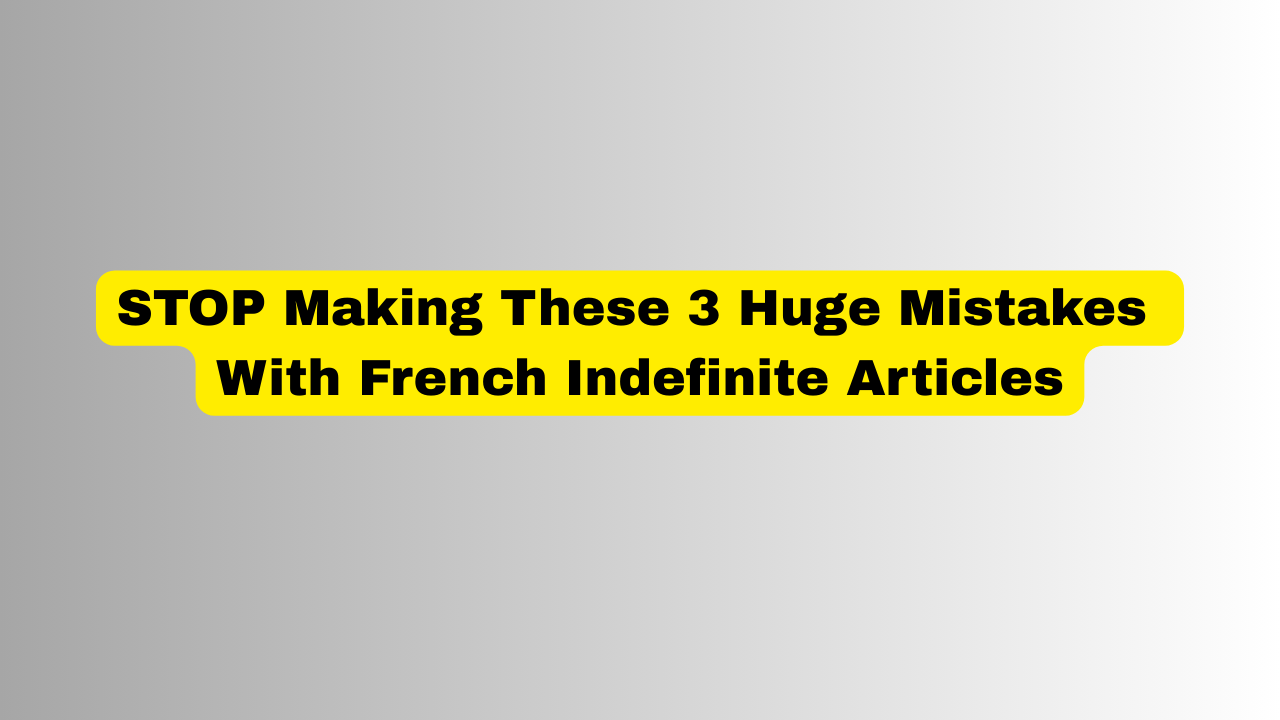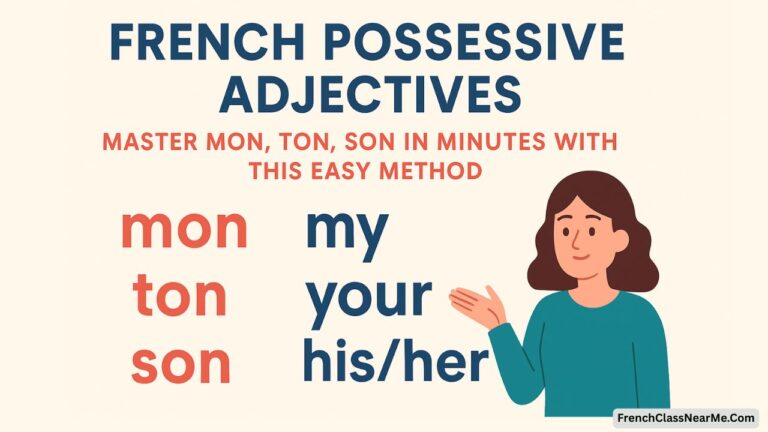Avoid These 5 Mistakes with French Indefinite Articles
Learning French can feel exciting, but certain details trip up English speakers—especially when it comes to French indefinite articles. If you’ve ever wondered when to use un, une, or des, you’re not alone. These tiny words carry big weight in French grammar, and using them incorrectly can make your sentences sound unnatural or confusing.
In this guide, we’ll tackle five common mistakes learners make with French indefinite articles and explain how to avoid them. Along the way, you’ll get clear examples and practical tips to speak and write more confidently.
What Are French Indefinite Articles?
Before diving into mistakes, let’s clarify what we mean by indefinite articles. In French, these articles introduce an unspecified person or thing—something that is not specific or previously mentioned.
There are three main indefinite articles in French:
- un – used for singular masculine nouns (un livre – a book)
- une – used for singular feminine nouns (une chaise – a chair)
- des – used for plural nouns of either gender (des fleurs – some flowers)
Pretty straightforward, right? Not so fast. Many English speakers assume these words work the same as “a,” “an,” and “some” in English—but that’s where mistakes happen.
Mistake 1: Using “des” Instead of “de” After Quantities or Negation
One of the most common pitfalls involves phrases with quantities or negative expressions. English speakers often assume that since des means “some,” it should always stay in plural form. But French changes things up here.
Wrong: J’ai beaucoup des livres.
Right: J’ai beaucoup de livres. (I have a lot of books.)
Whenever you have an expression of quantity—like beaucoup de, peu de, assez de—you replace des with de (or d’ before a vowel).
The same happens in negative sentences:
Wrong: Je n’ai pas des amis.
Right: Je n’ai pas **d’**amis. (I don’t have any friends.)
So, the rule? After quantities or in negation, use de instead of des. This is a classic trap for English speakers because in English we still say “some” or leave it out entirely, but in French, the change is mandatory.
Mistake 2: Forgetting Gender and Using the Wrong Article
Gender in French is tricky for learners, and indefinite articles change based on it. Masculine nouns use un, feminine nouns use une.
Wrong: un chaise
Right: une chaise (a chair)
Wrong: une stylo
Right: un stylo (a pen)
Here’s the secret: always learn the gender with the noun from day one. Don’t just memorize chaise—memorize une chaise. When you build this habit, you’ll naturally pick the correct article without guessing.
Mistake 3: Adding “Un” or “Une” After Être for Professions or Nationalities
English speakers often make this mistake because we say: “He is a doctor.” In French, you don’t use an indefinite article after être when talking about professions, religions, or nationalities—unless you add an adjective.
Wrong: Il est un médecin.
Right: Il est médecin. (He is a doctor.)
But if you add an adjective, the article comes back:
Correct: C’est un bon médecin. (He is a good doctor.)
This rule feels odd at first, but it’s a key part of sounding natural in French.
Mistake 4: Keeping “Des” Before an Adjective in Plural
This one trips up even intermediate learners. In French, when an adjective comes before the plural noun, des changes to de.
Wrong: J’ai acheté des jolies robes.
Right: J’ai acheté de jolies robes. (I bought some pretty dresses.)
The logic? When the adjective precedes the noun, the article gets simplified. So always use de in these cases, no matter what the adjective is.
Mistake 5: Dropping the Indefinite Article When It’s Required
English allows us to skip “a” in some cases, but French doesn’t work that way. You can’t just say J’ai chien—it sounds incomplete.
Wrong: J’ai chien.
Right: J’ai un chien. (I have a dog.)
Indefinite articles are essential in French because they show the number and gender of the noun. Always include un, une, or des unless a specific grammar rule removes it (like Mistake 3).
How to Master French Indefinite Articles
Now that you know the five major mistakes, how do you avoid them for good? Here are some quick tips:
- Learn nouns with their articles. Don’t just memorize stylo—memorize un stylo.
- Practice with sentences. Flashcards with full phrases help you internalize gender and article usage.
- Watch for “de” replacements. After quantities or before plural adjectives, always check the article.
- Listen to native speakers. French audio or videos will train your ear to spot correct usage.
Examples to Reinforce the Rules
Here are a few examples combining the rules we’ve covered:
- J’ai un chat et une souris. (I have a cat and a mouse.)
- Je n’ai pas **d’**argent. (I don’t have any money.)
- Elle est professeur, mais c’est une excellente professeur. (She is a teacher, but she’s an excellent one.)
- Nous avons acheté de magnifiques fleurs. (We bought some beautiful flowers.)
Notice how these examples show real-life usage of French indefinite articles in different contexts.
Why Getting This Right Matters
Mastering indefinite articles in French is not just about grammar—it’s about sounding fluent and natural. Small mistakes like using des instead of de or forgetting un/une can make your French sound awkward. When you use them correctly, you instantly sound more polished and confident.
Final Thoughts
French indefinite articles—un, une, des—look simple, but they carry rules that English speakers often overlook. By avoiding these five mistakes—misusing des after quantities, forgetting gender, adding un/une after être, keeping des before adjectives, and dropping the article—you’ll make a huge leap in accuracy and fluency.
The best way to master them? Practice, listen, and read as much French as possible. Over time, these rules will become second nature.
So, next time you speak French, ask yourself: Did I choose the right article? If the answer is yes, you’re already sounding like a pro.
Quick Recap: The 5 Mistakes to Avoid
- des → de after quantities or in negation.
- Mixing up un and une.
- Adding un/une after être for professions.
- Forgetting de before plural adjectives.
- Dropping the article when it’s needed.
Master these, and French indefinite articles will no longer be a mystery!







